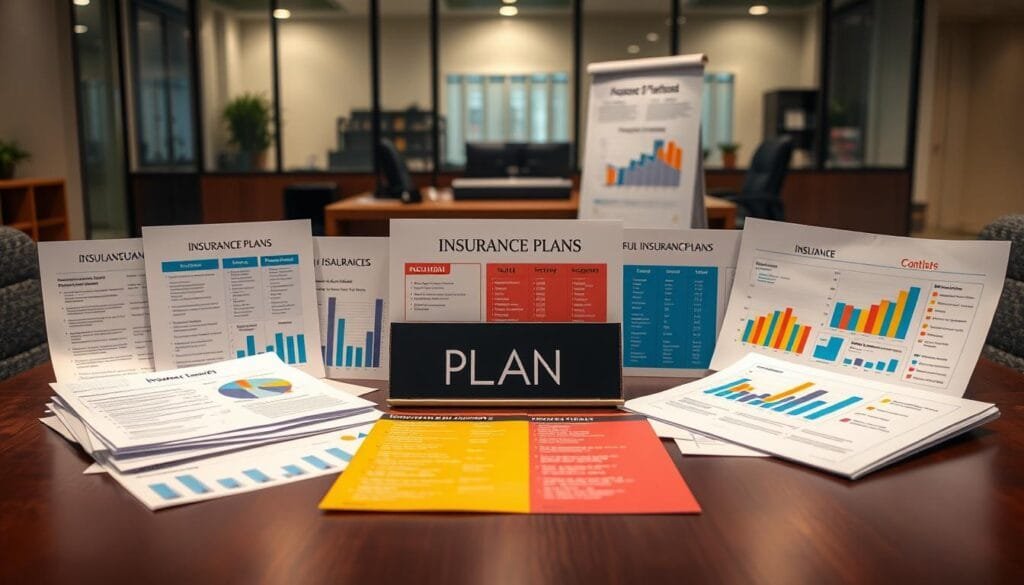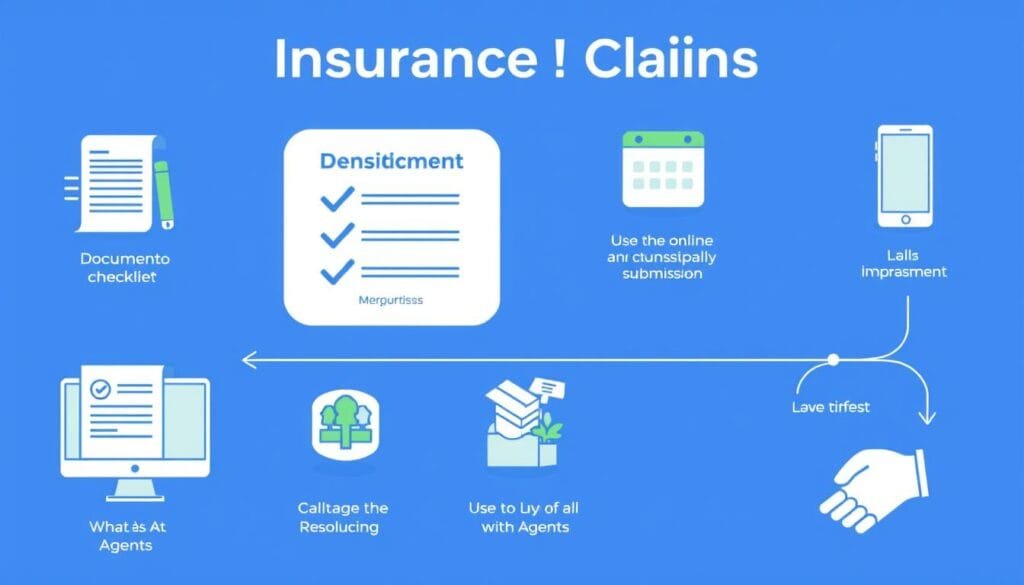ביטוח הוא חיוני בתכנון פיננסי. זה פועל כרשת ביטחון ללא ידיעה מראש. לדעת מה מכסה הביטוח שלך חיוני לניהול סוגים שונים של ביטוח, כגון בריאות, רכב ובעלי בתים.
מדריך זה מסביר כיסוי ביטוח, כולל היתרונות שלו והאי כלול. להיות מודע עוזר לך לקבל החלטות חכמות. זה מבטיח שיש לך את הכיסוי הנכון להגנת הנכסים והבריאות הפיננסית שלך.
מסקנות מרכזיות
- כיסוי ביטוח מגן נגד משאבים פיננסיים בלתי צפויים.
- סוגים שונים של ביטוח מגישים צרכים ספציפיים.
- הבנת אפשרויות כיסוי חיונית להגנה מתאימה.
- היו מודעים לאי כלולים נפוצים בביטוח.
- להעריך פיקדונות בעת בחירת תוכנית ביטוח.
- להיות מודע מוביל להחלטות ביטוח טובות יותר.
מבוא לכיסוי ביטוח
להבין כיסוי ביטוח
הביטחון הוא מפתח להגנת נכסים וניהול סיכונים. זה מתבצע דרך חוזה בין חברת הביטוח ובעל הפוליסה. ביטוח אומר הסכם שבו חברת הביטוח משלמת על אובדן מסוים בתמורה לדמי ביטוח.
הגדרת כיסוי ביטוח
כיסוי ביטוח הוא תוכנית המגן נגד אובדנים ספציפיים. פוליסה חזקה מפרטת את התנאים, התנאים המיוחדים, ומתי יש פיצוי. לדעת את הפרטים הללו חיוני לתכנון פיננסי והבנת האובדנים שמוגנים.
חשיבות הבנת הכיסוי
ערך הביטוח עובר מעבר לבטיחות פיננסית. לדעת את הפוליסה שלך היטב עוזר לך לראות סיכונים אפשריים ומכין אותך למצבים בלתי צפויים. בעלות כיסוי נכון מצילה אותך מלחץ פיננסי פתאומי, מאפשרת לך לבחור בחוכמה בין ביטוחים.
סוגי פוליסות ביטוח
זה חיוני לדעת על הפוליסות השונות שקיימות. כל סוג יש לו יתרונות ופרטים מיוחדים שמתאימים לצרכים שונים.
ביטוח בריאות
ביטוח בריאות הוא בעיקר כדי לכסות חשבונות רפואיים. זה כולל ביקורים אצל רופא, שהייה בבית חולים, ותרופות. ישנם הרבה תוכניות לבחירה, כולל אלה מהעבודה שלך ותוכניות ממשלתיות כמו מדיקייר ומדיקייד. לבחירת הביטוח הבריאות הנכון עוזרת לטפל בעלויות רפואיות בצורה קלה יותר.
ביטוח רכב
ביטוח רכב מגן עליך מבעיות הקשורות לרכב, כמו תאונות, גניבות ונזקים. כללית, יש ביטוח אחריות, תקרה וכיסוי מקיף. להכיר ביטוח רכב היטב יכול לעזור לך לקבל החלטות חכמות.
ביטוח בעלי בתים
ביטוח בעלי בתים הוא מרכזי להגנת הבית והרכוש שלך. הוא מכסה נזקים מאש, גניבות או אירועים טבעיים. הוא גם מכסה אותך אם מישהו נפגע ברכוש שלך. לדעת אילו אפשרויות כיסוי יש לך חשוב להגן על ההשקעה בבית שלך.

הבנת אפשרויות כיסוי ביטוח
בחירת פוליסת ביטוח דורשת הבנה של האפשרויות של כיסוי. כל פוליסה מגיעה עם הגנות משלה. חשוב להבין מה מוכל, את האי כלול, וכיצד הפרעות ומגבלות משפיעות על הכיסוי שלך.
מה כללית כוללת
הכיסוי שאתה מקבל תלוי בפוליסה. לדוגמה, ביטוח בריאות עשוי לכלול ביקורים ברופא ותרופות. ביטוח בעלי בתים עשוי לכלול נזקים מאש או גניבה. הבנת הפרטים הללו עוזרת לך להחליט על הביטוח שלך.
אי כלולים נפוצים
ביטוח לא מכסה הכול. דברים כמו רעידות אדמה או שחיקה יומיומית עשויים שלא להיות מכוסים. חשוב לקרוא את הפוליסה שלך היטב. זה מבטיח שתדע מה אינו מכוס ותנהל טוב יותר את הסיכונות הפיננסיים שלך.
מגבלות כיסוי והפרעות
מגבלות הכיסוי מגבילות את מה שחברת הביטוח שלך תשלם עבור טענה. נניח שבפוליסת בעלי בתים שלך יש מגבלה של 250,000 דולר עבור נזקים. המונח
השולמים הם הכסף שתשלם מהכיס שלך לפני שחברת הביטוח שלך תשלם. לדוגמה, במקרה של דרישה בסכום של 5,000 דולר עם עצמאיות של 1,000 דולר, חברת הביטוח מכסה 4,000 דולר. הבנת זאת חשובה.

איך לבחור את מדיניות הביטוח הנכונה
בחירת מדיניות הביטוח הנכונה היא מרכזית להגנת הנכסים והבריאות שלך. התחל על ידי ניתוח הצרכים שלך בצורה מעמיקה. שקול את מעמדך הכלכלי, גורמי הסיכון והצרכים המסוימים שלך כדי למצוא את המדיניות המתאימה ביותר.
ניתוח צרכי הכיסוי שלך
התחל בהערכת צרכי הכיסוי שלך בפרטיות. חשוב לחשוב על:
- הנכסים שלך וערכם
- מצבי בריאות שעשויים לדרוש כיסוי נוסף
- אופי החיים שלך ומעמד משפחתי
- הדרישות המשפטיות לביטוח באזורך
להבין את הנקודות הללו יסייע לך לבחור בביטוח בצורה חכמה יותר.
השוואת מדיניות שונות
חשוב להשוות מדיניות כדי למצוא אחת שעונה על צרכיך ותקציבך. כדאי להתבונן ב:
| סוג פוליסה | סכום הכיסוי | עלות פרמיום | פרוטה |
|---|---|---|---|
| ביטוח בריאות | $1,000,000 | $400/חודש | $2,000 |
| ביטוח רכב | $250,000/$500,000 | $150/חודש | $1,000 |
| ביטוח בעלי בתים | $350,000 | $800/שנה | $1,500 |
להבחין בהבדלים אלו עוזר לך לראות איזו מדיניות מעניקה את הערך הטוב ביותר. רשום את היתרונות והחסרונות.
ייעוץ עם סוכני ביטוח
שיחה עם סוכני ביטוח מציעה תובנות עמוקות יותר. המומחים האלה מכירים את השוק היטב ויכולים לעזור לנווט בין האפשרויות. הם יכולים לגשת למגוון ספקים, מה שהופך את השוואת המדיניות לקלה יותר. השתמש במומחיותם כדי למצוא ייעוץ שמתאים לצרכים הספציפיים שלך.

מסקנה
הבנת מדיניות ביטוח שונה ואפשרויות היא חיונית להגנת הכספים שלך. להבין את צרכיך מאפשר לך לבצע בחירות חכמות לגבי הכיסוי שלך. ביטוח בריאות, רכב ובעלי בתים כל אחד יש לו יתרונות ומגבלות משלו לחשוב עליהם.
זה חשוב באמת להבין את הכיסוי שלך בביטוח. על ידי הסתכלות מקרוב על מדיניות שונות, תוכל להגן על עצמך מהוצאות גדולות ובלתי צפויות. הידע הזה מאפשר לך להשיג את המרב מהביטוח שלך, נותן לך שקט נפשי וביטחון כלכלי טוב יותר.
לבחירות ביטוח מושכלות יש השפעה חיובית על השביעות רצון והגנה יותר. למידה על אפשרויות הביטוח שלך מעניקה לך תחושת שליטה יותר ועוזרת למנוע סיכונים. ההבנה הזו היא מרכזית להתמודדות עם מורכבויות הביטוח.






















